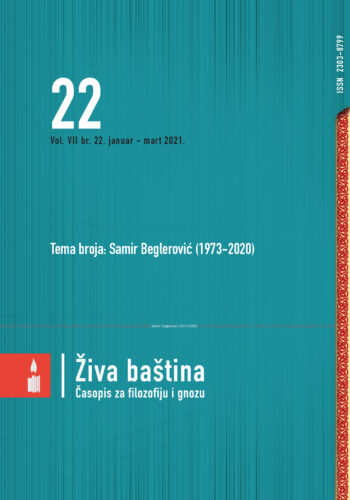UDK 141.336
U radu se izlažu osnove učenja o vilajetu unutar konstitutivne i interpretativne tradicije islama. Pojam vilajeta pripada najranijem sufijskom iskustvu iako će, kakav je slučaj i s teološkim i pravnim doktrinama, iscrpno biti objašnjen tek nekoliko stoljeća kasnije kao jedno od najvažnijih i najsloženijih pitanja o kojem su raspravljali čuveni sufijski učitelji. Upravo će učenje o vilajetu biti ugaoni kamen na kojem će Ibn ‘Arebi, sistematizirajući ideje i duhovna iskustva svojih prethodnika, izgraditi, uvjetno kazano, vlastiti sufijski sistem, koji će u narednim stoljećima utjecati ne samo na sufijske nego i na teološke i filozofske tokove mišljenja. Magrepska škola tesavvufa kojoj pripada Ibn ‘Arebi, iz koje je nastao šazilijski sufijski red, naročito je bila fokusirana na pitanja vilajeta, duhovne hijerarhije evlija, te na doktrinu savršenog insana odnosno quṭba ili duhovnog pola univerzuma. Koliko god vilajet bio značajan na teorijskoj razini tesavvufa, ništa manje nije važan i na njegovoj praktičnoj razini kao inicijacijska moć bez koje uopće nije moguće kročiti na duhovni put. Zbog toga se bez upoznavanja sa sadržajima i dimenzijama vilajeta ne može govoriti o dubljem i suštinskom razumijevanju samog tesavvufa. Međutim, nisu samo sufijski učitelji raspravljali o pitanju vilajeta nego su to činili i teolozi i filozofi.
Ključne riječi: vilajet, duhovna vlast i hijerarhija, muhamedanska zbilja, quṭb, savršeni čovjek.
The Theological-Sufi Teaching on Vilayet (Friendship with God)
Edin Dedić
Abstract
The paper presents the basics of the teaching on vilayet within the constitutive and interpretative tradition of Islam. The concept of vilayet belongs to the earliest Sufi experience although, as it is the case of theological and legal doctrines, it will be explicated only a few centuries later as one of the most important and complex questions debated by famous Sufi teachers. It is precisely the teaching on vilayet that would be the cornerstone on which Ibn ̒Arabī will build his own Sufi system, by systemizing the ideas and spiritual experiences of his predecessors, and, in the following centuries it would influence not only the Sufi, but also the theological and philosophical streams of thought. The Maghreb school of tasawwuf, to which Ibn ̒Arabī belongs and from which the Shadhili Sufi order arouse, was especially focused on the questions of vilayet, the spiritual hierarchy of evliya and the doctrine of the perfect human, i.e. a quṭb or the spiritual pole of the universe. However important vilayet may be on the theoretical level of tasawwuf, it is no less important on its practical level as an initiatory power without which it is impossible to set foot on the spiritual path. Therefore, without getting acquainted with the contents and dimensions of vilayet one cannot discuss the deeper and essential understanding of tasawwuf. However, it was not just Sufi teachers who debated the question of vilayet, but so did theologians and philosophers.
Keywords: vilayet, spiritual authority and hierarchy, Muhammadan reality, quṭb, perfect human.
[tags]

